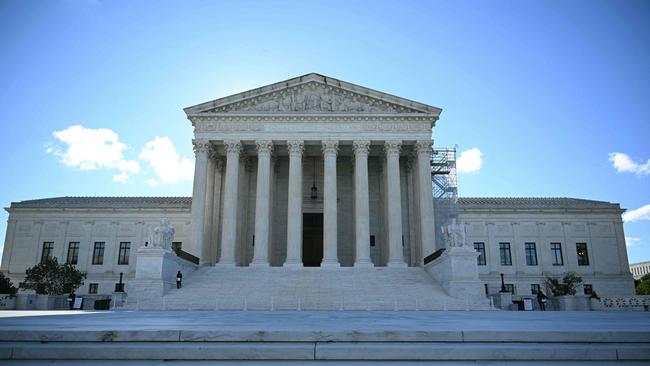Supreme Court limits prosecutions of former presidents, casting cloud over charges against Trump
The Supreme Court has ruled that former US presidents retain significant immunity from prosecution for acts taken while in office, a decision that could hamper efforts to prosecute Donald Trump.

The Supreme Court ruled on Monday that former US presidents retain significant immunity from prosecution for acts taken while in office, a decision that could hamper efforts to prosecute Donald Trump for his alleged attempt to subvert the 2020 election.
The court previously has handed Mr Trump victories in two separate cases stemming from his followers’ January 6, 2021, attack on the US Capitol, where they sought to stop congress from certifying President Joe Biden’s victory.
On Friday, the court narrowed the scope of an obstruction charge federal prosecutors have filed against January 6 rioters as well as Mr Trump himself. The justices found that the offence was limited to interference with documents and other things required by an official proceeding – not obstructing an actual meeting of congress. Lower courts will have to sort out the opinion’s impact on the January 6 prosecutions.
That followed the court’s March decision restoring Mr Trump’s eligibility for the Colorado ballot, after that state’s highest court disqualified the Republican candidate under a constitutional provision that bars former officeholders who engaged in insurrection or rebellion from future office. The Supreme Court said that states lacked authority to enforce the Reconstruction-era clause against federal candidates.
While Monday’s decision is sure to colour perceptions of Mr Trump’s potential criminality, it is also bound to affect public opinion of the court. Three Trump appointees sit on the nine-member court, where their votes have cemented historic victories for long-sought conservative goals, from the 2022 decision overruling Roe v. Wade to another ruling on Friday that overturned a Reagan-era precedent requiring judicial deference to executive-branch agencies when the law is ambiguous.
But no case to date has put Mr Trump’s personal interests so directly in the hands of the justices he appointed – and from whom he has expected a sympathetic hearing. Moreover, two other justices have familial ties to Mr Trump’s cause – Justice Clarence Thomas’s wife, Ginni Thomas, urged White House officials to take steps to block Mr Biden from taking office; Justice Samuel Alito’s wife, Martha-Ann Alito, flew flags at the couple’s homes like those carried by January 6 rioters, the justice has said.
However ironclad the legal rationales behind their votes, the justices’ actions cannot avoid being viewed in the context of such connections.
Mr Trump has been indicted in four different cases, two at the federal level by special counsel Jack Smith. The case before the high court involved perhaps the most serious charges: allegations by Mr Smith that Mr Trump participated in an illegal scheme whose aim was to deny Mr Biden the victory he won on election day in 2020.
Under a Justice Department policy, sitting presidents can’t be prosecuted for violating federal law, while a 1981 Supreme Court precedent held that former presidents can’t be sued by private parties over their official acts while in office. Mr Trump, who denies wrongdoing across the board, argued that similar immunity should insulate him from standing trial for crimes he allegedly committed as president.
By pursuing the immunity argument, Mr Trump derailed, at least temporarily, the spectacle of trial in federal court. The appeal froze the prosecution and forced US District Judge Tanya Chutkan to scratch a trial that had been scheduled to begin March 4.
At the Supreme Court, Mr Trump’s lawyers argued that without immunity for their official acts, presidents would be hamstrung from taking bold action in the national interest for fear that such decisions could be prosecuted as crimes by subsequent administrations. The special counsel contended that such fears were overblown because of internal safeguards within the Justice Department and the independent check on prosecutorial overreach that grand juries and federal courts provide.
Both sides pointed to the unprecedented nature of the Trump prosecution for support: The ex-president argued that Mr Smith had broken a tradition of not charging former presidents with crimes. The special counsel countered that no president who lost re-election before had broken the law to block the transfer of power.
The charges against Mr Trump, handed up by a federal grand jury in August 2023, include using dishonesty and fraud to obstruct the electoral process and conspiring to deny citizens’ rights to have their votes counted.
Ms Chutkan rejected Mr Trump’s immunity claim in December, a decision upheld in February by the US Court of Appeals for the District of Columbia Circuit. From the start, however, Mr Trump’s attorneys placed hope in the Supreme Court.
Mr Trump’s team contended that the most serious allegations he faces, including pressuring state officials and vice-president Mike Pence to participate in the scheme to retain power, should be classified as official actions beyond the reach of the law.
At oral arguments in April, justices in the court’s conservative majority said little about the allegations against Mr Trump. The hearing instead focused on speculative risks to future presidents from bad-faith prosecutors who theoretically could bedevil a former chief executive with partisan grudges dressed up as criminal charges.
Should Mr Trump prevail in November, upon return to the White House he could order the federal charges against him withdrawn or attempt to pardon himself for past crimes, ending both the Washington case and separate charges Mr Smith filed in Florida alleging Mr Trump illegally took national-security documents from the White House when leaving office in 2021 and refused to turn them over when requested by federal officials. State proceedings against Mr Trump could also freeze, based on the constitutional supremacy of federal law over those enforced by the states.
The Wall Street Journal



To join the conversation, please log in. Don't have an account? Register
Join the conversation, you are commenting as Logout